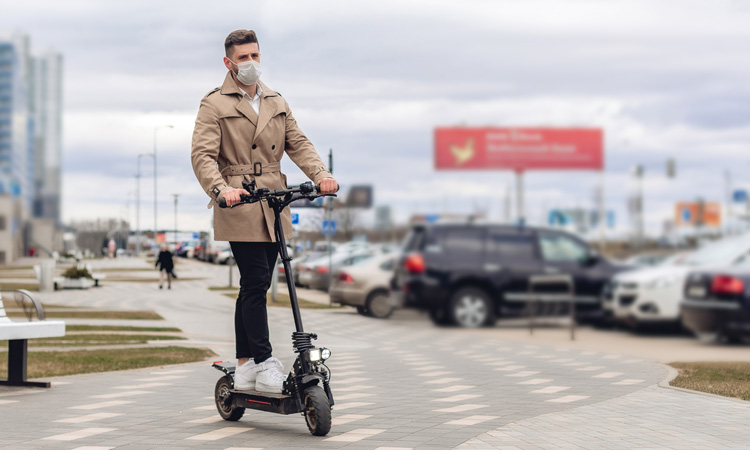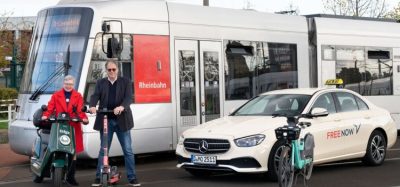COVID-19 forces mobility firms to dramatically scale back services
- Like
- Digg
- Del
- Tumblr
- VKontakte
- Buffer
- Love This
- Odnoklassniki
- Meneame
- Blogger
- Amazon
- Yahoo Mail
- Gmail
- AOL
- Newsvine
- HackerNews
- Evernote
- MySpace
- Mail.ru
- Viadeo
- Line
- Comments
- Yummly
- SMS
- Viber
- Telegram
- Subscribe
- Skype
- Facebook Messenger
- Kakao
- LiveJournal
- Yammer
- Edgar
- Fintel
- Mix
- Instapaper
- Copy Link
Posted: 30 March 2020 | Sam Mehmet (Intelligent Transport)
In light of the ongoing coronavirus (COVID-19) pandemic and consequential drops in ridership, mobility services, such as taxis and e-bike and e-scooter schemes, have been forced to suspend operations and find ways to adapt their offerings.


The novel coronavirus (COVID-19) pandemic, almost in its fourth month, has seen every industry across the world impacted. Transport services have been scaled back and, in some cases, countries have completely suspended public transport operations as they look for ways to prevent the spread and rising death toll of COVID-19.
Shared scooter/bike services
Among these are shared and rental mobility services, such as taxis, e-bike and e-scooter schemes and other micromobility offerings. Lime and Bird, two of the world’s largest shared schemes with operations in approximately 120 and 80 cities respectively, have both suspended their services in cities across the world to help halt the spread of the virus.
“In all of our markets, except for South Korea, we will begin winding down and pausing our service to reflect public health guidance. Lime continues to closely monitor developments around the world and remains in coordination with health and regulatory authorities in more than 25 countries,” Lime said in a statement.
Bird has also seen drastic changes; the company has reportedly recently laid off approximately 30 per cent of its staff – circa 400 people – amid the uncertainties surrounding the COVID-19 outbreak. “The unprecedented COVID-19 crisis has forced our leadership team and the board of directors to make many extremely difficult and painful decisions relating to some of your teammates,” Bird CEO, Travis VanderZanden, reportedly wrote to staff in a memo, obtained by TechCrunch. “As you know, we’ve had to pause many markets around the world and drastically cut spending. Due to the financial and operational impact of the ongoing COVID-19 crisis, we are saying goodbye to about 30 per cent of our team,” it continued.
Other micromobility operators are attempting to avoid service suspensions through increased device cleaning and advice alerts in-app. E-scooter/e-bike service Wheels even recently launched a ‘self-cleaning’ device which sanitises its handlebars and brakes with mineral nanocrystals after light exposure. Other companies such as Voi have also included gloves and sanitising wipes with devices as a way to increase sanitation.
Taxi services
On-demand taxi services such as Lyft and Uber have also been impacted as government recommendations to stay at home and reduce mobility have resulted in dramatic drops in demand across the world – Uber has reportedly seen drops in ridership by as much as 70 per cent in some cities.
Some reports have seen Uber drivers account being suspended amid the virus outbreak. “We may temporarily suspend the accounts of riders or drivers confirmed to have contracted or been exposed to COVID‑19. We’re also consulting with an epidemiologist to make sure our efforts as a company are grounded in medical advice,” it said in a statement online.
“Any driver or delivery person who is diagnosed with COVID‑19 or is individually asked to self‑isolate by a public health authority will receive financial assistance for up to 14 days while their account is on hold. We’ve already helped drivers in some affected areas, and we’re working to quickly implement this worldwide,” it continued.
Lyft’s response was similar, and in a bid to alleviate unemployment among its drivers, the company announced that it is expanding services to include deliveries of medical supplies, essential foods and other critical goods, with around 100,000 drivers already having signed up. The company also recently announced a partnership with Amazon in which it is referring its drivers via a dedicated web portal, which is said to have placed drivers in part-time and full-time employment in as little as seven days.
However long the outbreak continues, it is certain that mobility and transit is going to be affected for the foreseeable future. Riders, passengers and operators all have a part to play in reducing the dangers presented by COVID-19, and only time will tell if they are truly effective.
Related topics
COVID-19, Mobility Services, Vehicle & Passenger Safety, Workforce Inclusivity
Related modes
Bikes & Scooters, Ride-sharing & Car-sharing, Taxi
Related people
Travis VanderZanden








